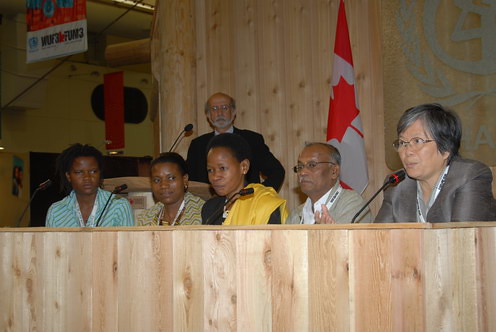Stop Karachi City Government from evicting poor people
A massive demolition drive against informal settlers is taking place in Karachi City in Pakistan. The city government calls it an anti-encroachment drive to beautify the city. It will demolish more than 20 villages or informal settlements which will net for the government some 450 acres of prime urban land.
REITs [Real Estate Investment Trust] create rental refugees
How US REIT AIMCO deals with renters: In their coalition agreement, the Berlin grand coalition basically advocated for stock market speculation via introduction of tax-free German Real Estate Investment Trusts, also known as REITs. But delegates of SPD’s [Social Democratic Party] left wing cry foul now. REITs could result in losses of trillions and create the destruction of Germany’s social housing structures. In the US, REITs make money by turning renters into refugees and by demolishing [mostly] HUD subsidized apartment complexes.
HIC General Assembly
Habitat International Coalition (HIC) convokes all its members to the next General Assembly, which will take place on Tuesday, June 20th, in the evening, at WUF3, Vancouver BC, Canada.
HIC General Assembly
Habitat International Coalition (HIC) convokes all its members to the next General Assembly, which will take place on Tuesday, June 20th, in the evening, at WUF3, Vancouver BC, Canada.
HLRN Board Members
Joseph Schechla and Shivani Bhardwaj were elected for a four year term.
New HLRN Board Members
Joseph Schechla and Shivani Bhardwaj were elected for a four year term.
U.N. Rights Experts Concerned Over Indian Dam Project
The United Nations human rights experts want India to stop the construction of the Narmada Valley dam project, which will submerge the homes and land of tens of thousands of people.
HIC at the European Social Forum
The 4th European Social Forum will take place from May 3 - May 7 in Athens, Greece. Information on location, registration, programme at http://athens.fse-esf.org I like to inform you about [...]
Namada Valley: demand for halting the construction of the dam till the displaced people were resettled
According to environmental-activist Vandana Shiva, the struggle of Narmada Bachao Andolan had become a bigger issue than of displacement. "It is now an issue of wastage of water for entertainment complexes along the Sabarmati in Ahmedabad. It has now become an issue of precious water being used for genocidal agriculture policies. It is whether the people of India would be able to live in this land or will our land and water become inputs for globally profitable corporates. It is not just a struggle of last 20 years but a struggle of the next 20 years."
HIC at the World Urban Forum
The next annual events of Habitat International Coalition will take place in Vancouver, Canada, from 18 to 24 June 2006
Basic principles and guidelines on development-based evictions and displacement
Evictions are a growing threat to world's poor. Forced evictions are acts and/or omissions involving the coerced or involuntary displacement of individuals, groups and communities from homes and/or lands and common property resources.
HIC at the World Urban Forum
The next annual events of Habitat International Coalition will take place in Vancouver, Canada, from 18 to 24 June 2006
